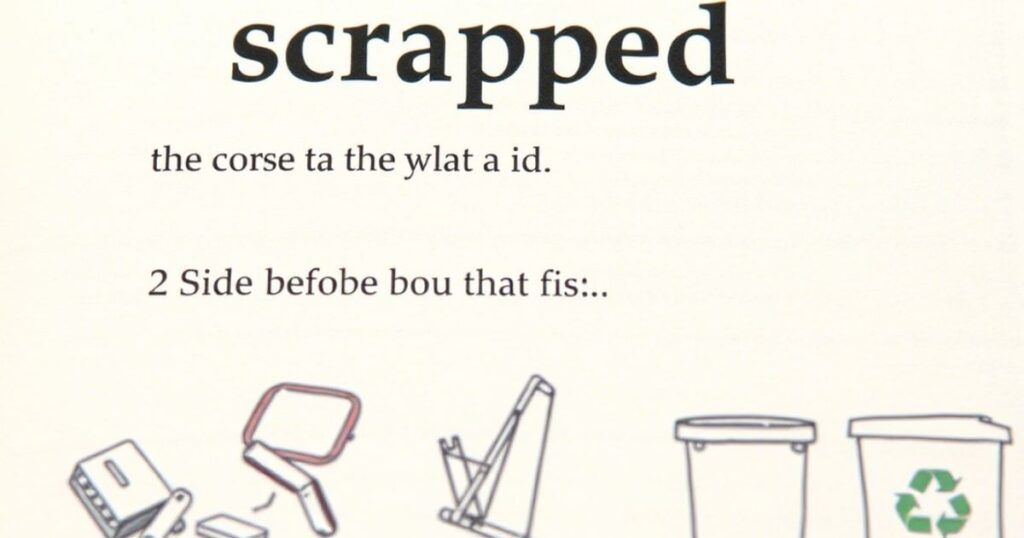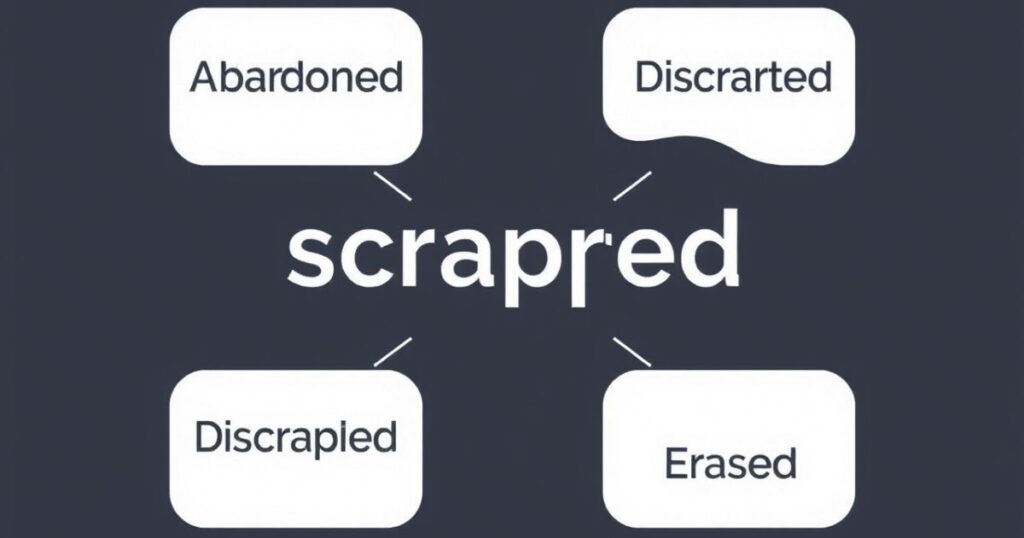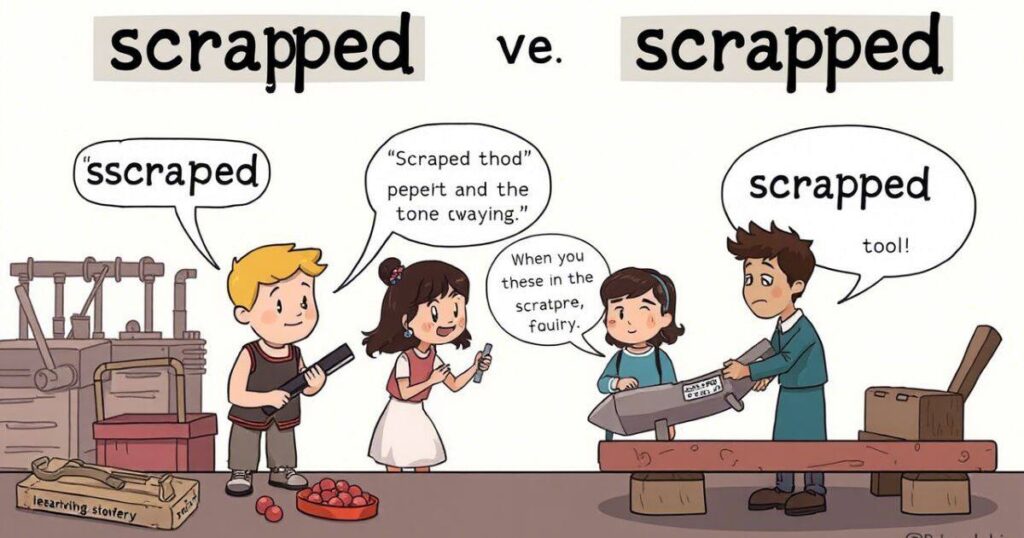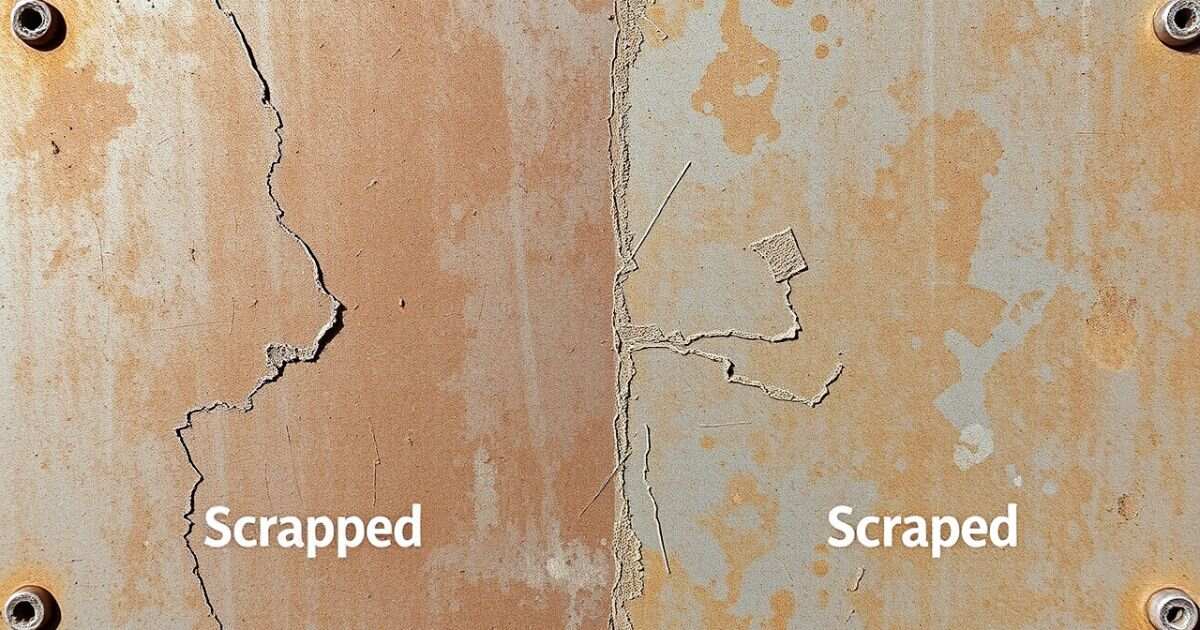Ever found yourself wondering whether it’s “scrapped or scraped“? You’re not alone! These two words sound similar, but their meanings couldn’t be more different. “Scrapped” is all about discarding or abandoning something no longer useful. On the flip side, “scraped” refers to physically removing something from a surface, usually with friction or rubbing.
Understanding the difference between “scraped vs scrapped” or “scraping vs scrapping” can make a big impact on how clearly you communicate. “Scrap vs scrape” shows us the key distinction: one deals with disposal, while the other involves cleaning or material removal. Stick around as we clear up the confusion and teach you how to use “scrapped or scraped” the right way in any situation. Whether you’re faced with “scrapped vs scraped” or “scrapped or scraped,” you’ll know exactly when to use each one!
Why is There Confusion?
The confusion between scrapped or scraped often trips people up because they sound similar, but they have distinct meanings. Scrapped refers to something being discarded, canceled, or abandoned, like a scrapped idea or scrapped car. It suggests the item or plan is no longer in use. If you’re ending or throwing something away, scrapped is the right word.
On the other hand, scraped means removing something by rubbing or dragging, or collecting something in small amounts, like scraped data or scraped knees. It’s more about physical or digital removal. When deciding which to use, remember this: if it’s about removal or gathering, use scraped; if it’s about canceling or discarding, go with scrapped. The focus keyword “Scrapped or Scraped” is key when understanding and choosing the correct term.
What Does the Word “Scrapped” Mean?

The word “scrapped” typically refers to something that has been discarded, abandoned, or removed from consideration. In both literal and figurative contexts, it suggests the cancellation or discontinuation of plans, projects, or items.
Whether it’s a machine part in an industrial process or a failed project, “scrapped” implies that the effort has been deemed unworthy of further use or attention, often due to a lack of success or unforeseen challenges.
What Does the Word “Scraped” Mean?
The word “scraped” generally refers to the physical action of removing a thin layer from a surface, often through friction or abrasion. This can apply to a variety of contexts, from cleaning a surface with a brush to removing material like paint or rust with a scraper.
Metaphorically, “scraped” can describe a narrow escape or a situation where success is achieved by a minimal margin, barely making it through a challenge. It signifies effort, even in the face of hardship, when things are scraped together just to move forward.
“Scrapped” vs “Scraped”: Differences
| Feature | Scrapped | Scraped |
| Meaning | Discarded or abandoned due to lack of usefulness or need. | Removed material from a surface through rubbing or abrasion. |
| Verb Tense | Past tense of “scrap,” indicating something has been discarded. | Past tense of “scrape,” indicating the action of removal. |
| Typical Context | Used for canceled projects, plans, or things that are no longer needed. | Used for cleaning or removing a layer from surfaces. |
| Figurative Interpretation | Can imply failure, abandonment, or giving up on an effort. | Can suggest achieving something with minimal success or effort. |
| Physical Action Involved | No direct physical action, more about abandonment or discontinuation. | Involves physical action to remove or scrape off material. |
| Associated Themes | Discontinuation, abandonment, and disposal of resources. | Cleaning, surface preparation, and removing layers. |
| Example in Industry | “The design was scrapped after feedback showed it was unfeasible.” | “He scraped off the excess paint using a wire brush.” |
| Use in Material Removal | Not typically used in direct material removal contexts. | Commonly used for processes that involve scraping off materials like paint, rust, or dirt. |
| Origin | Came from Middle English scrappen, meaning to discard or eliminate. | Derived from Old Norse skrapa, meaning to scrape or scratch. |
| Effect on Outcome | Suggests that something has failed or is no longer considered viable. | Indicates overcoming challenges to accomplish a minimal or difficult task. |
Which One Should You Use: “Scrapped or Scraped”?
Use “scrapped” when referring to something that has been discarded, abandoned, or discontinued, while “scraped” is appropriate when discussing the physical act of removing material from a surface.
Use “Scrapped” The term “scrapped” is best used when referring to something that has been discarded, abandoned, or deemed no longer useful. It often applies to projects, plans, or items that are canceled or discontinued due to various reasons, such as lack of success or feasibility. For example, a company might scrap a product idea if it doesn’t align with their goals, or an individual may scrap a personal plan when it no longer serves their purpose. In this context, “scrapped” conveys finality and the decision to move on.
Use “Scraped” is used when describing the physical action of removing material from a surface, often through friction or abrasion. For example, you might scrape off dirt, paint, or rust using a tool like a scraper or a brush. It can also be used metaphorically to describe narrowly achieving something, such as “scraping by” in a difficult situation. This term highlights effort and action, whether it’s cleaning, repairing, or managing to succeed with minimal resources.
“Scrapped” is used when something is abandoned or discarded, while “scraped” refers to physically removing material from a surface.
Examples in Context
For “scrapped or scraped“, synonyms for “scrapped” include “discarded,” “abandoned,” “canceled,” and “jettisoned,” all of which convey the idea of something being discontinued or deemed no longer useful. In contrast, “scraped” can be substituted with terms like “removed,” “abraded,” “scoured,” and “raked,” which emphasize the physical act of scraping or cleaning a surface.
Examples of Scrapped
- The company’s plan to expand into new markets was scrapped due to unforeseen economic downturns.
- The research project was scrapped after initial findings showed no significant results.
- The event was scrapped because of poor weather conditions and low attendance.
- After much deliberation, the government scrapped the controversial policy.
- The new product design was scrapped when the prototype failed to meet safety standards.
- The team scrapped their plans for a big launch after facing unexpected budget cuts.
- Due to technical issues, the software update was scrapped before it could be released.
- The construction project was scrapped when it became clear that the budget would not cover the costs.
- The proposed merger between the two companies was scrapped after failing to meet regulatory approval.
- The artist scrapped the sculpture after realizing it didn’t match their vision.
- The marketing campaign was scrapped mid-way when it was evident that it wasn’t resonating with the target audience.
- The school’s plans for a new sports facility were scrapped after the city cut funding.
Related Guide:
Trailer or Trailor: Which Spelling Is Correct and Why?
Examples of Scraped
- He scraped the old paint off the walls before applying a fresh coat.
- The mechanic scraped off the rust from the car’s undercarriage to prevent further damage.
- She scraped the last bit of peanut butter from the jar with a knife.
- The chef scraped the dough off the counter to roll it out evenly.
- After the accident, he scraped the dirt off his clothes and continued on.
- The workers scraped the snow off the driveway to clear the path.
- I scraped together enough money to buy the concert tickets last minute.
- They scraped the surface of the wooden floor to remove the scratches.
- She scraped a small amount of cream from the top of the milk to add to her coffee.
- The volunteers scraped the leftover food off the plates to dispose of it properly.
- The runner scraped through to the finals, despite a slow start in the race.
- The artist scraped away the excess clay to reveal the fine details of the sculpture.
Synonyms and Similar Terms to “Scrapped” and “Scraped”

For “scrapped or scraped”, synonyms for “scrapped” include “discarded,” “abandoned,” “canceled,” and “jettisoned,” all of which convey the idea of something being discontinued or deemed no longer useful. In contrast, “scraped” can be substituted with terms like “removed,” “abraded,” “scoured,” and “raked,” which emphasize the physical act of scraping or cleaning a surface.
Synonyms for Scrapped
- Discarded: To throw something away because it is no longer needed.
Example: The broken chair was discarded. - Abandoned: To leave something behind, often after giving up on it.
Example: The old factory was abandoned after years of neglect. - Canceled: To decide that something will not happen or continue.
Example: The concert was canceled due to heavy rain. - Jettisoned: To throw away or discard something, often in an emergency.
Example: The crew jettisoned the excess cargo to lighten the plane. - Eliminated: To completely remove or get rid of something.
Example: The company eliminated the outdated software from their system. - Discontinued: To stop making or offering something.
Example: The company discontinued the product after poor sales. - Removed: To take something away or out of a place.
Example: The clutter was removed from the office space. - Dropped: To stop or abandon something abruptly.
Example: They dropped the idea of expanding overseas. - Retired: To stop using or actively engaging with something, especially after a long period of use.
Example: The athlete retired from the sport after winning a gold medal. - Recycled: To process and use something again, often after it’s been deemed no longer useful.
Example: The outdated electronics were recycled for their parts. - Wasted: To use or spend something carelessly or without value.
Example: The team wasted the opportunity to improve the project. - Forsaken: To abandon something or someone, often in a metaphorical sense.
Example: The once-popular book series was forsaken by the author. - Dismantled: To take something apart, often with the intention of stopping it from functioning.
Example: The team dismantled the old equipment to make room for upgrades. - Thrown out: To discard something because it is no longer useful.
Example: The expired food was thrown out after inspection. - Decommissioned: To take something out of service, typically due to obsolescence or disuse.
Example: The old military vehicles were decommissioned after years of service.
Synonyms for Scraped
- Removed: To take something off or out of a place.
Example: He removed the sticker from the wall carefully. - Abridged: To shorten or reduce something by cutting part of it.
Example: The editor abridged the lengthy article for the magazine. - Scoured: To clean or scrub something thoroughly, often with abrasive materials.
Example: She scoured the pot to remove the stubborn stains. - Raked: To gather or collect something by pulling or dragging.
Example: He raked the leaves into a pile for disposal. - Brushed: To remove or clean something lightly using a brush.
Example: She brushed the dust off the table. - Shaved: To remove a thin layer of material, often with a sharp tool.
Example: He shaved the wood to smooth the surface. - Scratched: To make small, shallow cuts or marks on a surface.
Example: He scratched the paint off the old car. - Polished: To smooth or clean something by rubbing it.
Example: She polished the silverware until it gleamed. - Scuffed: To scrape or mark a surface by dragging something over it.
Example: The shoes scuffed the floor as she walked. - Sanded: To smooth or polish a surface using sandpaper.
Example: He sanded the edges of the table to remove rough spots. - Grated: To scrape or rub something into small pieces, typically with a grater.
Example: She grated the cheese for the salad. - Wiped: To clean or remove something from a surface by rubbing it.
Example: He wiped the crumbs off the counter. - Shredded: To cut or tear something into small pieces by scraping or pulling.
Example: The machine shredded the documents into tiny strips. - Filed: To smooth or shape something using a file.
Example: He filed down the rough edge of the metal. - Cleaned: To remove dirt, dust, or unwanted material from a surface.
Example: She cleaned the windows to improve visibility.
Origins of “Scrapped” and “Scraped”

The word “scrapped” originates from the Old Norse word “scrap,” meaning scraps or fragments, evolving in the 13th century to refer to discarded materials. Meanwhile, “scraped” comes from the Middle English word “scrapen,” derived from the Old French “escraper,” meaning to scrape or rub a surface, emphasizing the physical act of removal.
Origins of “Scrapped”
The word “scrapped” traces its roots back to the Old Norse word “skrap,” meaning scraps or fragments, which referred to small, leftover pieces of something. By the 13th century, it evolved in Middle English to describe the act of discarding or abandoning something that is no longer useful. Over time, “scrapped” became commonly used to refer to anything that is thrown away, whether due to obsolescence, damage, or lack of necessity.
Origins of “Scraped”
The word “scraped” originates from the Middle English term “scrapen,” which came from the Old French word “escraper,” meaning to scrape or rub a surface. This term was used to describe the physical act of removing or smoothing a surface, often by friction. Rooted in the idea of abrasion, “scraped” has retained this meaning through the centuries, expanding to include various forms of material removal or cleaning.
FAQ’s
When should I use “scrapped or scraped” in writing?
Both words are used in different contexts; “scrapped” refers to discarding, and “scraped” involves removing material from a surface.
What’s the difference between “scrapped or scraped” in meaning?
“Scrapped” means abandoned or discarded, while “scraped” refers to physical removal or rubbing.
Can “scrapped or scraped” be used interchangeably?
No, they have distinct meanings: “scrapped” is for abandonment, and “scraped” refers to cleaning or removing.
How does “scrapped or scraped” apply in industrial contexts?
In industrial terms, “scrapped” refers to discarded materials, while “scraped” involves physically removing surface layers.
When do you use “scrapped or scraped” in project planning?
“Scrapped” is used when a project is canceled, and “scraped” is for removing unnecessary elements.
Conclusion
Understanding the difference between “scrapped or scraped” is essential. “Scrapped” means to discard something, like a plan or an item, because it’s no longer useful. On the other hand, “scraped” refers to removing something from a surface, often by rubbing or using friction. When comparing “Scrapped or Scraped,” remember that one is about abandonment, and the other is about physical action.
When discussing “scraping vs scrapping,” it’s important to recognize the different contexts. “Scrap vs scrape” also brings out a clear contrast: “scrap” is about disposal, while “scrape” is about cleaning or removing material. Whether it’s “scrapped or scraped” or “scrapped vs scraped,” the key is understanding these subtle differences in meaning and usage.

Ember Rose is a dedicated administrator with 4 years of experience in efficient operations management and team leadership. Skilled in streamlining workflows and enhancing productivity.

